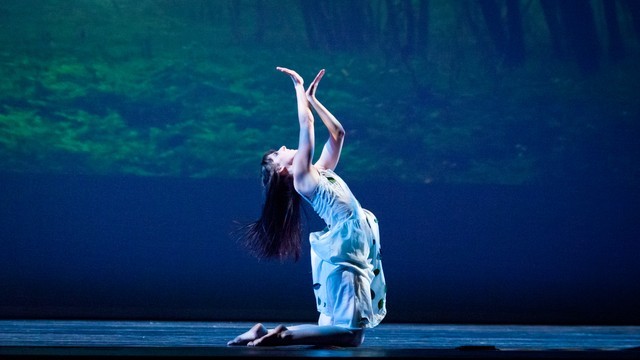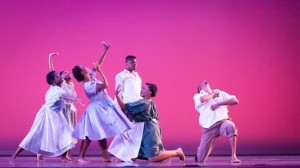FrenetiCore The Sacred Harp

Freneticore Sacred Harp. Photo by Ed Schipul.
To honor its ten-year anniversary FrenetiCore Dance Theater revisits its first full-length work, The Scared Harp, a collaborative effort between choreographer Rebecca French, the group’s artistic director, and company dancers. We’re told it’s been reworked, but the sketchiness of concept says “work in progress.”
This al fresco dance, a country-fried interracial Romeo and Juliet, seemed right at home at Miller Outdoor Theatre last Friday, April 19, during a surprise chilly evening. The diverse audience, young and old of all types, bundled under hoodies and shawls, chatted lively, munched their popcorn, laughed at the comic moments, and sat stupefied when the work veered into strange, if not outright oddity.
Harp tells a simple story, but trips over wrong-footed choices. These unintentional stumbles thrust us right out of the drama. We can’t get close to the characters because the creators keep them at arm’s length, too.
We’re in the rural south, maybe the hills of Georgia, but definitely not during this era. In cinematographer Ashley Horn’s panorama of aerial shots, projected upstage, we soar through an idyllic rolling countryside, past barns, a small town, a whitewashed church. Using archival recordings of hymns and American folk music (“Poor Wayfaring Stranger,” “Freckle Faced Liza,” “Chicka Li Lee,” and other classics), which overlay the work with an Americana authenticity lacking elsewhere, we meet the townsfolk. They stride stately, bend backward, then reach up, up. While not moving strictly in unison they are a group of like-minded folks, blacks and whites, young and old. The women wear sundresses and aprons, the men in suspenders or bib overalls, the young girls in bloomers. The preacher (Varina Rush) is barefoot with raggety pants. Lifts and carries are the singular movements that define this community. And then things go screwy.
The preacher, with banjo accompaniment on the recorded musical track, gives his sermon as the congregation sits with their backs to us on benches. It’s a lovely stage picture, but his sermon is Dr. Seuss’ “Oh, the places you’ll go.” This kiddie poem, full of uplift and doggerel rhyme (“You have brains in your head. You have feet in your shoes. You can steer yourself any direction you choose.”) seems more apt for a grade-school graduation, not a church sermon. It’s bizarre and has an unintended whiff of condescension as preacher man talks down to these plain country yokels.
Later, a Girl in Green, aka Juliet (Mallory Horn) is discovered in a lovely arbor of trees as she explores the world around her and her burgeoning feelings of growing up. In prayerful poses, she kicks up her legs, twirls, and chaine turns. She hugs herself. She is definitely happy. Elijah, aka Romeo, (Denzel Taylor) spies her, and taken by her freshness, responds in kind, showing off for her as he leaps about. They mirror each other’s movements. Lively and rhythmic, the duet is as cheerful as the dancers. While not demanding, it’s heartfelt. They are watched by some children. In an awkward transition, he sends her away and then runs out himself.
Meanwhile — there are a lot of meanwhiles in this plot which should be as simple as a sampler — two drunk teens (Ruben Trevino and Carlos Guzman), a hillbilly duo of Huck Finn and Tom Sawyer in suspenders and wife beaters, perform a drunk duet to Leonard Emmanuel’s whoopin’ and yodelin’ “Whale Swallowed Jonah.” In playful rivalry, they roll about the floor, slap at each other, and manage to hold onto their beer cans. They roll over each other and keep on going out of sight. It’s a comic highlight this work sorely needs.

Freneticore Sacred Harp. Photo by Ed Schipul.
The most original movement is given to the black members of the community. Sinewy and percussive, they undulate to “Gospel Train.” They bend at the waist and slowly roll upright as they snake across the stage, earthy and elemental.
Complications ensue with the arrival of an itinerate preacher (Drew Peerless) who will later sway the community to evil deeds. In the oddest segment of the evening, he preaches, lip syncs actually, to a recording of Seuss’ “Green Eggs and Ham.” This is a very bad choice. This extended passage, with the entire company miming the fox, the mouse, the boat, the goat, the car, etc…oh, it’s awful. Dumfoundingly so. These good people in Act I go bad because of nonsense poetry? It makes no sense at all, and everything that comes after is diminished.
Romeo and his Juliet have an athletic pas de deux to Almeda Riddle’s idiosyncratic rendition of “I Love My Little Rooster,” but this folksy classic is hardly appropriate for a love duet. The second song is a much better fit, Anthony Newley/Leslie Bricusse’s “Feeling Good” (“Birds flying high, you know how I feel…”) With increasing intensity, the two lovers swoon in lifts and swirling embraces until, finally, they roll locked on the floor.
The pair’s lovemaking is discovered by the community, urged on by the fire-and-brimstone preacher to seek vengeance. The best image of the night is his rock-solid entrance, with arm outstretched in old testament prophet-mode, as the townsfolk sweep by him toward the couple on the ground. The plot flies into high gear. Elijah is stomped to death; a pregnant Juliet solos in the graveyard; the good preacher steps in front of the wicked preacher who’s about to shoot her, dying in her stead. Suddenly, like a vision in a D.W. Griffith silent movie resolution, everything’s all right with the world? Peace restored? Bigots forgiven? How? Why? We don’t see it in the dancing, we don’t hear in in the music. We must take it on faith.
The Sacred Harp is ambitious, but bumpy. It’s always a pleasure to listen to, though, with those fragrant bluegrass songs and gospel hymns, and the appealing FrenetiCore dancers aim to please. But it’s filled with such a diversity of movement and styles — there’s a tap section for a mom and her daughter (Kira Boerkircher and Aileen Mapes) that comes out of nowhere and goes nowhere — that the story floats away, becoming elongated instead of building to a satisfying finish. Character motivation is nonexistent. What’s been literal and homespun turns into woozy, feel-good symbolism. Maybe there’s a Dr. Seuss verse for it. But I doubt it.



Recent Comments